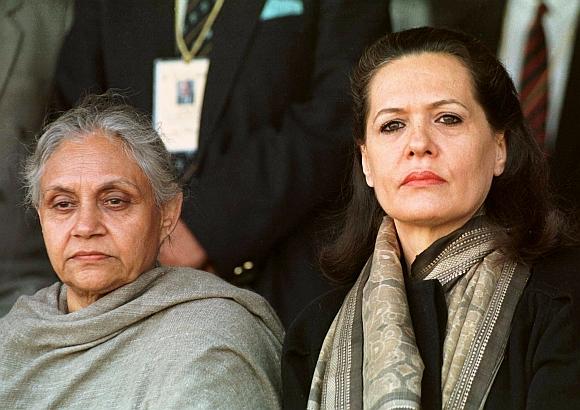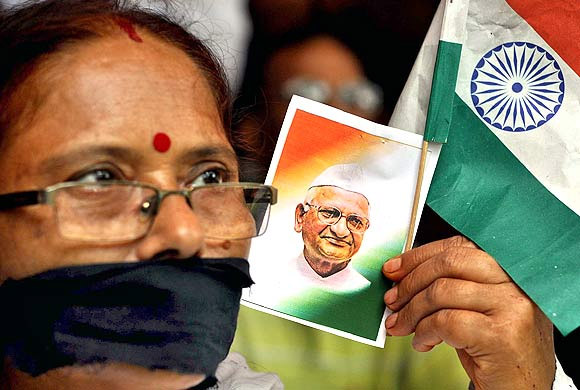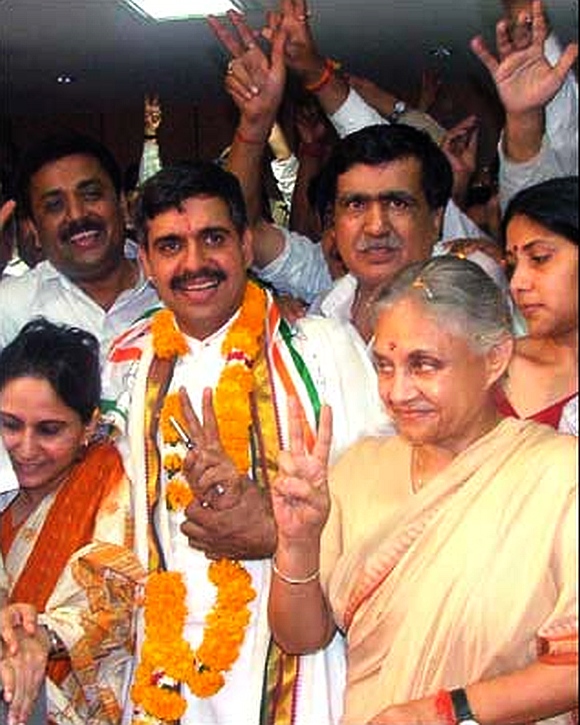 | « Back to article | Print this article |
Delhi MCD elections: Is Congress losing urban India?
After Bengaluru, where the Congress lost out to the Bharatiya Janata Party after five decades of dominance, and Mumbai where it failed to wrest the cash rich Brihanmumbai Municipal Corporation from the Shiv Sena, it is now the turn of New Delhi to show its disenchantment with the Congress, writes Neerja Chowdhury
An important factor for the United Progressive Alliance's victory in both the 2004 and the 2009 general elections was the support the Congress got from urban and metro India. This now seems to be shifting away, indicating a growing public mood against the Congress, though the party is trying to find solace in the small town corporations it has recently won in Maharashtra.
What adds to the party's worry is that the results of the municipal corporation election in Delhi come as one more defeat for the Congress, after Punjab, Uttar Pradesh, and Goa and just scraping through in Uttarakhand.
In the normal course, the Congress should have captured the now trifurcated municipal corporations in Delhi, with anti-incumbency against the BJP taking its toll. In 1997, for example, the Congress had lost out to the BJP, in 2002 it gained control from the BJP and similarly, in 2007, the BJP defeated the Congress. This time it should have been advantage Congress.
Instead, the BJP has won all the three corporations. It is not as if the saffron party's performance in the last five years was something to write home about. There were allegations of corruption against the corporators. And yet the people of Delhi voted back the BJP.
Click NEXT to read further...
The BJP flogged corruption and rising prices
This only goes to show that they may have voted on issues other than just the local ones. Maybe anticipating what may be in store for the party, Shiela Dixit had referred to the anti-Centre and anti-Congress mood evident in the recent assembly elections.
Though the prime minister and several senior ministers have dismissed the MCD results as a local affair, the polls in the country's capital can hardly be viewed as just a local election. While the Congress had made development its main selling point, the BJP flogged corruption and rising prices, blaming both the state and national governments, and it specially targeted Dixit.
Corruption is undoubtedly an issue with the urban middle class today. But it is not as potent as price rise. Though a plethora of scandals has gone against the ruling Congress, people do not consider the BJP to be any better.
If there is one issue which is proving to be the undoing of the Congress, and is agitating large sections, it is price rise and they hold the Congress responsible for it.
The result has naturally created a sense of despondency in the party. The legislators realise that if there is a 'mahaul' (ambience) building up against the Congress, as the MCD outcome suggests, it may negate the good work they -- be it corporators, members of the legislative assembly or members of Parliament-- may do in their constituencies, no matter how hard they try.
Click NEXT to read further...
Dixit's son's work would give him a natural advantage
Dixit may have calculated that her ploy to go in for the trifurcation of the MCD and provide 50 per cent reservation for women might soften the blow, and enable the Congress come to power in one or two of the corporations, such as south Delhi and east Delhi, instead of losing one composite one.
East Delhi is represented by her son Sandeep Dixit, and a victory there, given the work he has done in his constituency, would have given him a natural advantage in the Congress's power structure in Delhi.
The Congress had also hoped to win in south Delhi, where the BJP did not win a majority but emerged as the single largest party. The large number of independents getting elected in South Delhi may be a pointer that many people are not enamoured of either the Congress or the BJP.
Neither trifurcation nor reservation to women worked, even though the latter move was a historic one, with long-term implications because it would be readying a pool of women politicians who will be available and able to contest elections in the future.
But women appear to have been influenced more by their kitchen budgets going awry than by reservation in local bodies.
Going by experience, it would be premature to conclude that the MCD outcome is a semi-final for the 2013 assembly polls in Delhi. For the Congress had lost in the MCD elections in 2007 too, but it went on to win the Delhi assembly elections in 2008 and the seven Lok Sabha seats in 2009.
Click NEXT to read further...
The knives are already out for Dixit
And yet, there is the flip side to the story, which cannot be wished away. If the Congress could not take advantage of the anti-incumbency against the BJP in the MCD, how will it be able to beat back the three-term incumbency of Dixit next year, beleaguered as she is by the Commonwealth Games scam, Shunglu report, prices and so on?
Nothing succeeds like success or fails like failure and the knives are already out for Dixit, with her own partymen openly criticising her for her move to trifurcate the civic body. Will the Congress high command move her from Delhi, maybe to the central government, and bring a new face in Delhi, to mark a break from the past, to try and negate anti-incumbency?
Or will that be too much of a risk, to bring a newcomer who will take time to settle in? After all, the Congress in Delhi is identified with her and the BJP, as of now, does not have a leader of stature to take her on.
She had said not long ago that it was up to the party high command to decide whether she should move to the Centre -- just as it was the party leadership which had decided 14 years ago that she would move from UP to Delhi.
However, the moot point is that if an adverse `mahaul' is what the Congress is grappling with, then a mere a change of face on its own may not work.
The message for the Congress is clear. It will have to take a hard look at the writing on the wall as a party, and go in for course correction. It can no longer do some tinkering or go for cosmetic changes and let it be business as usual.
It has set up a committee to go into the causes of the poll defeats it has recently suffered. But then, it had undertaken similar exercises in the past also and the reports gather dust in some forgotton alimirah at 24 Akbar Road, the party headquarters.
The Delhi result may be a wake-up call for the Congress. The trouble is that the Congress has become less of a party and more of a conglomerate made up of leaders who are pursuing their own individual agendas.
TOP photo features of the week
Click on MORE to see another set of PHOTO features...




